北京2011课标四年级下册 Unit 3 Can you tell me the way lesson10
- 格式:pptx
- 大小:10.50 MB
- 文档页数:33
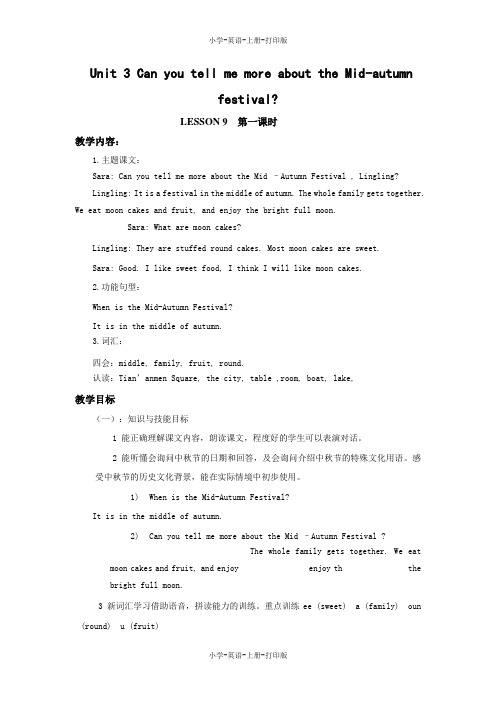
Unit 3 Can you tell me more about the Mid-autumnfestival?LESSON 9 第一课时教学内容:1.主题课文:Sara: Can you tell me more about the Mid –Autumn Festival , Lingling?Lingling: It is a festival in the middle of autumn. The whole family gets together. We eat moon cakes and fruit, and enjoy the bright full moon.Sara: What are moon cakes?Lingling: They are stuffed round cakes. Most moon cakes are sweet.Sara: Good. I like sweet food, I think I will like moon cakes.2.功能句型:When is the Mid-Autumn Festival?It is in the middle of autumn.3.词汇:四会:middle, family, fruit, round.认读:Tian’anmen Square, the city, table ,room, boat, lake,教学目标(一):知识与技能目标1 能正确理解课文内容,朗读课文,程度好的学生可以表演对话。
2 能听懂会询问中秋节的日期和回答,及会询问介绍中秋节的特殊文化用语。
感受中秋节的历史文化背景,能在实际情境中初步使用。
1) When is the Mid-Autumn Festival?It is in the middle of autumn.2) Can you tell me more about the Mid –Autumn Festival ?The whole family gets together. We eat moon cakes and fruit, and enjoy enjoy th thebright full moon.3 新词汇学习借助语音,拼读能力的训练。
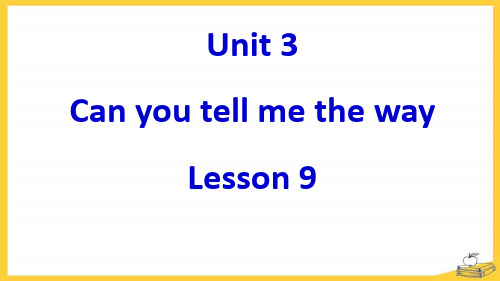
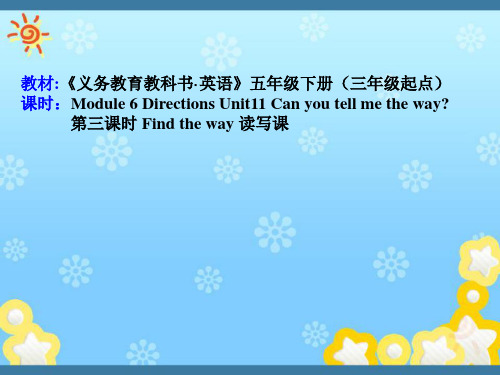
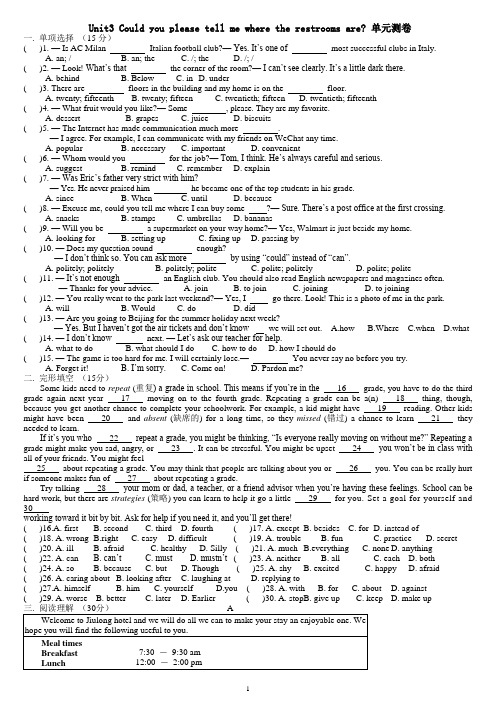
( )1. — Is AC Milan Italian football club?—Yes. It’s one of most successful clubs in Italy.A. an; /B. an; theC. /; theD. /; /( )2. — Look! What’s that the corner of the room?—I can’t see clearly. It’s a little dark there.A. behindB. BelowC. inD. under( )3. There are floors in the building and my home is on the floor.A. twenty; fifteenthB. twenty; fifteenC. twentieth; fifteenD. twentieth; fifteenth( )4. — What fruit would you like?— Some , please. They are my favorite.A. dessertB. grapesC. juiceD. biscuits( )5. — The Internet has made communication much more .— I agree. For example, I can communicate with my friends on WeChat any time.A. popularB. necessaryC. importantD. convenient( )6. — Whom would you for the job?—Tom, I think. He’s always careful and serious.A. suggestB. remindC. rememberD. explain( )7. —Was Eric’s father very strict with him?— Yes. He never praised him he became one of the top students in his grade.A. sinceB. WhenC. untilD. because( )8. — Excuse me, could you tell me where I can buy some ?—Sure. There’s a post office at the first crossing.A. snacksB. stampsC. umbrellasD. bananas( )9. — Will you be a supermarket on your way home?— Yes, Walmart is just beside my home.A. looking forB. setting upC. fixing upD. passing by( )10. — Does my question sound enough?—I don’t think so. You can ask more by using “could” instead of “can”.A. politely; politelyB. politely; politeC. polite; politelyD. polite; polite( )11. —It’s not enough an English club. You should also read English newspapers and magazines often.— Thanks for your advice. A. join B. to join C. joining D. to joining( )12. — You really went to the park last weekend?— Yes, I go there. Look! This is a photo of me in the park.A. willB. WouldC. doD. did( )13. — Are you going to Beijing for the summer holiday next week?—Yes. But I haven’t got the air tickets and don’t know _we will set out. A.how B.Where C.when D.what ( )14. —I don’t know next. —Let’s ask our teacher for help.A. what to doB. what should I doC. how to doD. how I should do( )15. — The game is too hard for me. I will certainly lose.—You never say no before you try.A. Forget it!B. I’m sorry.C. Come on!D. Pardon me?二. 完形填空(15分)Some kids need to repeat (重复) a grade in school. This means if you’re in the 16 grade, you have to do the third grade again next year 17 moving on to the fourth grade. Repeating a grade can be a(n) 18 thing, though, because you get another chance to complete your schoolwork. For example, a kid might have 19 reading. Other kids might have been 20 and absent(缺席的) for a long time, so they missed(错过) a chance to learn 21 they needed to learn.If it’s you who 22 repeat a grade, you might be thinking, “Is everyone really moving on without me?” Repeating a grade might make you sad, angry, or 23 . It can be stressful. You might be upset 24 you won’t be in class with all of your friends. You might feel25 about repeating a grade. You may think that people are talking about you or 26 you. You can be really hurt if someone makes fun of 27 about repeating a grade.Try talking 28 your mom or dad, a teacher, or a friend advisor when you’re having these feelings. School can be hard work, but there are strategies (策略) you can learn to help it go a little 29 for you. Set a goal for yourself and 30working toward it bit by bit. Ask for help if you need it, and you’ll get there!( )16.A. first B. second C. third D. fourth ( )17. A. except B. besides C. for D. instead of( )18. A. wrong B.right C. easy D. difficult ( )19. A. trouble B. fun C. practice D. secret ( )20. A. ill B. afraid C. healthy D. Silly ( )21. A. much B.everything C. none D. anything( )22. A. can B. can’t C. must D. mustn’t( )23. A. neither B. all C. each D. both( )24. A. so B. because C. but D. Though ( )25. A. shy B. excited C. happy D. afraid( )26. A. caring about B. looking after C. laughing at D. replying to( )27.A. himself B. him C. yourself D.you ( )28. A. with B. for C. about D. against( )29. A. worse B. better C. later D. Earlier ( )30. A. stopB. give up C. keep D. make up( )31. The hotel serves (提供) the following foods in rooms EXCEPT . A. Coffee B. cakes C. candy D. cold drinks( )32. The underlined word “valuables” means “” in Chinese.贵重物品 B. 行李C. 随身物品 D. 包裹( )33. If you’of the day so as not to pay for another day.A. 10:00 amB. 4:00 pmC. 6:30 pmD. 11:00 pm( )34. You should after 11:00 pm. A. watch TV B. turn down the TV C. clean your room D. turn off the radio (A. The waiters in the hotel work for 8 hours a day.B. The hotel can look after your things in the room well.C. You can’t book (预定) a room in the hotel after 6:30 pm.D. Your room is cleaned when you leave between 9:00 am and 4:00 pm.BI left my hometown in London last year and now I have enjoyed working in this small city in China. Learning a foreign language opens you up to the culture and history of a country. So in order to know more about China, I started to learn Chinese.But at times, I found myself in funny situations. When I greeted strangers in China, they began to talk a lot and very fast. They asked me questions about everything. But all I could do was to look at them with a blank face. I had no idea what they were talking about. Were they just being kind, funny or impolite? Many people want to make friends with me. But I am a bit upset when I find out the reason why they need a foreign f riend. They say they want to practice their English. I don’t need friends like this. I like friends to share my feelings and ideas with.However, the more Chinese I learn, the more similarities I find it has with English. In English, thick-skinned is to describe a person who doesn’t care for criticism (批评). I was surprised to find that houlianpi in Chinese means the same. And both languages share some common idioms (习语). For example, “look on with folded arms” means xiushoupangguan, and “burn the boats” is similar to pofuchenzhou.I’m still on my journey to learn Chinese. I believe that sometimes you have the most fun on a journey.( )41. The writer comes from . A. the UK B. the USA C. Australia D. Canada( .A. they are interested in Western cultureC. they are willing to share feelings and ideas with himD. they want to help foreigners with their Chinese( )43. The underlined word “similarities” means “” in Chinese.A. 相似点B. 不同点C. 规律性重要性( )44. A thick-skinned person may .C. talk a lot and speak fastD. feel OK when he’s criticized( )45. If there would be a paragraph before the last paragraph of the text, it most probably would be about .A. the reasons why he wants to learn ChineseB. the similarities Chinese and English shareC. the differences between Chinese and EnglishD. the importance of learning Chinese and English五. 短文填空(10分根据短文内容,从方框内选择合适的单词并用其适当形式填空,使短文完整、连贯。
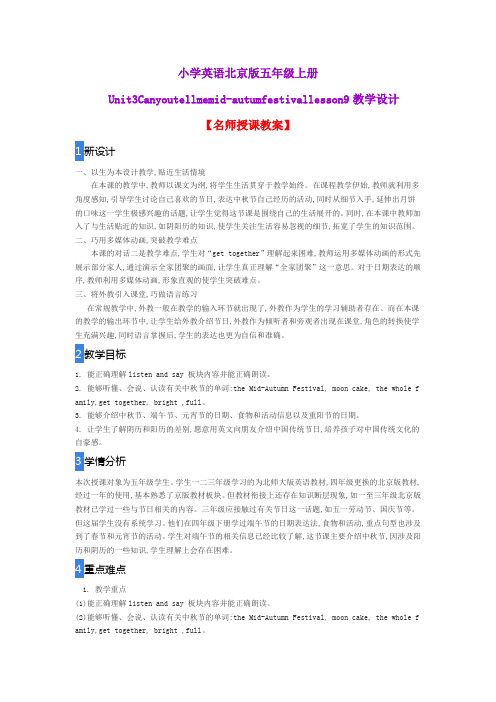
小学英语北京版五年级上册Unit3Canyoutellmemid-autumfestivallesson9教学设计【名师授课教案】1新设计一、以生为本设计教学,贴近生活情境在本课的教学中,教师以课文为纲,将学生生活贯穿于教学始终。
在课程教学伊始,教师就利用多角度感知,引导学生讨论自己喜欢的节日,表达中秋节自己经历的活动,同时从细节入手,延伸出月饼的口味这一学生极感兴趣的话题,让学生觉得这节课是围绕自己的生活展开的。
同时,在本课中教师加入了与生活贴近的知识,如阴阳历的知识,使学生关注生活容易忽视的细节,拓宽了学生的知识范围。
二、巧用多媒体动画,突破教学难点本课的对话二是教学难点,学生对“get together”理解起来困难,教师运用多媒体动画的形式先展示部分家人,通过演示全家团聚的画面,让学生真正理解“全家团聚”这一意思。
对于日期表达的顺序,教师利用多媒体动画,形象直观的使学生突破难点。
三、将外教引入课堂,巧做语言练习在常规教学中,外教一般在教学的输入环节就出现了,外教作为学生的学习辅助者存在。
而在本课的教学的输出环节中,让学生给外教介绍节日,外教作为倾听者和旁观者出现在课堂,角色的转换使学生充满兴趣,同时语言掌握后,学生的表达也更为自信和准确。
2教学目标1. 能正确理解listen and say 板块内容并能正确朗读。
2. 能够听懂、会说、认读有关中秋节的单词:the Mid-Autumn Festival, moon cake, the whole f amily,get together, bright ,full。
3. 能够介绍中秋节、端午节、元宵节的日期、食物和活动信息以及重阳节的日期。
4. 让学生了解阴历和阳历的差别,愿意用英文向朋友介绍中国传统节日,培养孩子对中国传统文化的自豪感。
3学情分析本次授课对象为五年级学生。
学生一二三年级学习的为北师大版英语教材,四年级更换的北京版教材,经过一年的使用,基本熟悉了京版教材板块。

Unit 3. Could you please tell me where the restrooms are?一、宾语从句宾语从句在复合句中作主句的宾语。
句型构成:连接词+ 主语+ 谓语1. 常由下面的一些连接词引导:①由that 引导,表示陈述意义that 可省略E.g. He says (that) he is at home. 他说他在家里。
②由if , whether 引导,表示一般疑问意义(带有是否、已否、对否等)E.g. I don’t know if / whether Wei Hua likes fish. 我不知道韦华是否喜欢鱼。
③由连接代词(who, whom, whose, what, which)、连接副词(when, where, why, how)引导 ,表示特殊疑问意义E.g. Do you know what he wants to buy? 你知道他想要买什么吗?2. 宾语从句的语序宾语从句的语序应为陈述句的语序。
例如:I hear (that) physics isn’t easy.I think (that) you will like this school soon.Can you tell me how I can get to zoo?Please tell me when we’ll have the meeting.3. 从句时态要与主句一致①当主句是一般现在时,从句根据情况使用任何时态He says (that ) he is at home. 他说他在家里。
I don’t know (that) she is singing now. 我不知道她正在唱歌。
She wants to know if I have finished my homework. 她想知道我是否已经完成了我的作业。
Do you know when he will be back? 你知道他将会什么时候回来?②当主句是一般过去时,从句应使用过去某时态(一般过去时,过去进行时,过去将来时,过去完成时)He said (that) he was at home. 他说他在家里。
Unit 3 Could you tell me where the restrooms are?语法宾语从句的用法:1.定义:动词后的句子叫宾语从句。
I think我认为I wonder我想知道He said他说或He said to me 他对我说He asked他问或He asked me他问我He told me他告诉我2.语序:宾语从句用陈述语序(陈述语序=引导词+肯定句的构成)①一般现在时的陈述语序是:引导词+主语+ is/are/are +其他。
或引导词+主语+ 动词原形/三单+其他②一般过去时的陈述语序是:引导词+主语+was/were+其他。
或引导词+主语+动词的过去式+其他。
③现在进行时的陈述语序是:引导词+主语+ is/am/are+ 动词-ing +其他。
④过去进行时的陈述语序是:引导词+主语+ was/were+ 动词-ing +其他。
⑤一般将来时的陈述语序是:引导词+主语+is/am/are going to+动词原形+其他。
或引导词+主语+will+动词原形+其他。
⑥过去将来时的陈述语序是:引导词+主语+was/were going to+动词原形+其他。
或引导词+主语+would+动词原形+其他。
⑦现在完成时的陈述语序是:引导词+主语+have/has+动词过去分词+其他。
⑧过去完成时的陈述语序是:引导词+主语+had+动词过去分词+其他。
3.引导词:宾语从句的引导词有三类:①that可省略,不翻译。
He says (that) he will study hard next term.②if/whether是否I wondered if/whether he would come here.③特殊疑问词:如what,where,how,when等。
My teacher asked me where I lived.4.时态:当主句是一般过去时时,宾语从句必须用过去的某种时态(如一般过去时,过去进行时,过去将来时,过去完成时)①He does his homework every day.→His mother said that he did his homeworkevery day.②He is listening to tapes. →His mother said that he was listening to tapes.③He will return here next Friday. →His mother said that he would return herethe next Friday.④He has already finished reading the book. →His mother said that he hadalready finished reading the book.注意:当宾语从句是客观事实或普遍真理时,永远都用一般现在时。
Unit 3 Can you tell me more about the Mid-autumnfestival?单元教案设计教材背景和学情分析(一)点出本单元的话题和相关的语言知识;教学内容本单元学习的话题是围绕询问,介绍中秋节,万圣节等中西方节日展开的。
学习在特殊的节日所做的特殊事情及表现形式。
学习了中西方历史文化背景的不同。
第九课将要学习询问中秋节时间的表达When is the Mid-Autumn Festival?It is in the middle of autumn. 以及学习对中秋节万圣节两个话题深入进行讨论的导火索Can you tell me more about the Mid-Autumn Festival. I like sweet food. I think I will like moon cakes. The whole family gets together. Can you tell me more about Halloween? Children dress up at night.第十一课在十课基础上继续学习了这个句型 Can you show me that sweater with a horse on it? Here it is.三课都围绕can you tell / show me…..因此学生要会用该句型讨论其他的人或事情。
对中秋节,万圣节的日期文化能够成段转述。
本单元涉及到的单词有:(红色字体为四会单词)形容词:round old, tall, friendly, young, kind, pretty,食物:fruit candy sticky rice dumplings moon cake动物:bear, elephant, mouse, duck lion bear horse动词:knock, say, Show地点名词:Tian’anmen Square, the city, computer room, art roomlake副词:up衣服:sweater名词:middle, family table , room, boat, the backpack with a mouse, the cap with a duck, the T-shirt with a football,本单元涉及到的短语有:中秋节:in the middle of 在…中间get together 聚集,收集eat moon cakes吃月饼enjoy the bright full moon 欣赏明亮的满月sweet food 甜点万圣节:dress up 打扮knock on 敲击say “Trick or treat”说是恶作剧还是好好招待get candy 得到糖果(candy 单复数一致)like to do 喜欢做某事at night 在夜晚a lot of 许多的,大量的购物:in the year of the horse 在马年be born 出生于with….on…在什么上面有什么there be 某地有某物(二)相关内容上位知识分析及结合上位知识分析确定的本单元的教学重;难点上位知识:本单元对于学生学习并不是特别陌生,三年级,四年级分别接触到了节日,及购物的课题学习,四年级下学期学习了中国传统节日端午节,儿童节时间的问法回答,及对节日大概的介绍。
Unit 3 测试题一.单项选择:1. You needn’t the girl to me. We’ve known each other for years.A.introduceB.showC. explainD. lead2. a player, I’m looking forward the 2016 Olympic Games.A.For, atB. As, toC. With, forD. Of, to3. The first one the finishing line was Liu Xiang, who become the best hurdler in the word.A. passB. pastC. crossD. through4. Tom, would you please the box? It’s for your sister.A. not openB. don’t openC. not to openD. to not open5. Traveling around big cities by taxi cancost a lot of money, but it’s usually to take the underground train to most places.A. amazingB. expensiveC. convenientD. exciting6. —Do you know _______?—Yes, in two days.A. when will Mr Li come backB. how long Mr Li will come backC. what time will Mr Li come backD. how soon Mr Li will come back7. This interesting book only ______ me ten yuan and I _______ ten month reading it.A. cost, spendB. cost, spentC. spends, costD. spent, costs8. ---Could you tell me ___? ---Sorry, I don't know. I was not at the meeting.A. what does he say at the meetingB. what did he say at the meetingC. what he says at the meetingD. what he said at the meeting9.Tom n ever w ent to bed he finished his homework last night.A.becauseB.ifC.untilD.while10. —I don’t know next. —Let’s ask our teacher for help.A. what to doB. what should I doC. how to doD. how I should do11.On my way home,I passa fruit shop every day.A.to,byB.to,pastC.\, byD.of, for 12.I mis s my g randparents very much. I’m seeing them again.A.looking forB.lo oking afterC.looking forwardD.looking forward to13. There are floors in the building and my home is on the floor.A. twenty; fifteenthB. twenty; fifteenC. twentieth; fifteenD.twentieth; fifteenth14.I som e of my free time playing basketball for my school team.A.spendB.costC.takeD.pay15.Long, long ago people did n’t know that the earth _____ around the sun.A.movesB. movedC. was movingD. move16.It’s nice___me out when I’m in trouble.A. for you to helpB. of you to helpC. for you helpingD. of you helping17. —Can you tell me ____I can get a storybook?—Sure. There’s a bookstore on Dongfang Street.A.thatB.whichC.whereD. whether18. I really don't know if she it when she .A.will find, arrivesB. will find, will arriveC. finds, arrivesD. finds, will arrive19. —Bob, may I _____your MP4 player? —Sure.But you’d better not___it to others.A. lend, borrowB. lend, lendC. borrow, borrowD. borrow, lend20. The teacher told us on the road.A. don't playB. not playC. not to playD. be not play二.用所给单词的适当形式填空。
姓名:P18—2dHe Wei: This is Fun Times Park — the biggest amusement park in my city!Alice: I’m excited to try the rides!He Wei: Where should we start with There’s Space World, Water World, Animal World ...Alice: Oh, could you first tell me where the restrooms areHe Wei: Pardon Restroom You already want to rest But we haven’t even started yet!Alice: Oh no, I don’t mean a room for resting. I mean ... you know, a washroom or bathroom.He Wei: Hmm ... so you mean ... the toiletAlice: Yes! Sorry, maybe people in China don’t often use the word “restroom” when they speak English. He Wei: That’s right. In China, we normally s ay “toilet” or “washroom” in English. Anyway, th ey’re just over there.Alice: OK. I’ll be quick!He Wei: No problem. Y ou don’t need to rush!何伟:这是快乐时光公园,我们城市最大的游乐园。
艾丽斯:去试坐那些游乐设施,我很兴奋!何伟:我们应该从哪里开始呢有太空世界、水上世界、动物世界……艾丽斯:在我们作决定之前,你能先告诉我冼手间在那里吗何伟:请再说一遍好吗休息室你想休息吗但是我们甚至还没有开始呢艾丽斯:哦,不是,我不是那个意思。